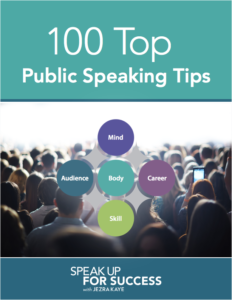 One of my clients was recently told by her CEO that “It’s always better to memorize your speech.”
One of my clients was recently told by her CEO that “It’s always better to memorize your speech.”
What her boss really meant was that it looks impressive if you can deliver your talk without holding paper in your hand (or on the podium). But whether it’s always better is another thing entirely!
My opinion? It’s not always better to memorize your speech — it’s only better if that works for you.
Here are three questions that will help you decide whether you should memorize your speech or not.
1. In General, Are You Good at Memorizing Things?
The ability to memorize words — like every other human trait or skill — occurs on a continuum:
- Some people are fantastically good at it, and will remember a 20-stanza poem they learned in second grade when they’re 65 years old.
- Other people have poor memorization skills. No matter how often they repeat or practice a single phrase, they won’t remember it two days (or even two hours) later.
- Most of us fall somewhere in the middle. This means that — while you can memorize your speech — that process is likely to take a significant amount of time.
And just in case you feel judged by this, memorization has no relationship to your intelligence, your communication skills, or your ability to deliver a great presentation.
2. How Long Is Your Speech?
There’s a big difference between memorizing speeches that are 3 minutes long and memorizing speeches that are 30 minutes long.
When you deliver a 30-minute speech from memory, it’s similar to running a marathon, with one big difference: If a marathoner gets unbearably disoriented or discouraged, he or she can just stop running.
But not a public speaker!
Even if your confidence flags or your memory fails, you’re committed to delivering your entire speech; and you might just find yourself wishing you had a few notes to help you across the finish line.
3. Do You Have Public Speaking Experience?
The chances are pretty good that, even if you memorize your speech to “perfection,” at some point while you’re delivering it, you’ll forget something.
This can happen because you get distracted, your energy level drops, or you just… forget!
But whatever the cause, it takes a certain amount of cunning, mental discipline, and sheer bravado to get through a memorization fail.
I last experienced this while delivering a conference presentation in 2013. I’d worked hard to memorize my talk, and everything was going great until suddenly — between one slide and the next — my mind went completely blank.
I don’t think anyone else noticed this epic fail (or at least, no one told me that they’d noticed it!) but faking through eight minutes until my memory returned wasn’t fun, and I wouldn’t recommend it to anyone who hasn’t had at least some public speaking experience.
As for me, I no longer go onstage without having notes for backup. It’s nice to not need your notes… but it’s even nicer to know they’re close at hand if you do need them!
So Should You Memorize Your Speech, or Not?
If you still haven’t figured out your answer, think about your tolerance for risk:
- I have some clients who love being on a high wire, and will literally laugh if they fall off.
- But for others, the mere idea of forgetting what they were going to say as they stand before an audience is unbearable.
Socrates said to know thyself, and if you know which of these camps you fall into, you already know what’s your best approach.
So memorize your speech if you want; if you’re willing to put in the time and effort; and if you can handle the possible discomfort of being all too human in public.
Just don’t decide to memorize your speech because someone else thinks that it’s “always better.”
And in case you wondered, my client took her notes to the podium, delivered her speech with confidence, and got big kudos from her CEO!

 Buy 100 Top Public Speaking Tips: The Book!
Buy 100 Top Public Speaking Tips: The Book!
In 25 years of speaker coaching, I’ve helped my individual speaker coaching clients develop their strengths and skills to become authentic and effective communicators.
Along the way, I’ve developed tips for everything from small talk to speaking up in meetings, from managing fear to making an impact.
And now, I’ve shared it all in 100 Top Public Speaking Tips: The Book. This beautifully designed PDF booklet is searchable, clickable, and categorized, so that you can find what you need, instantly.

